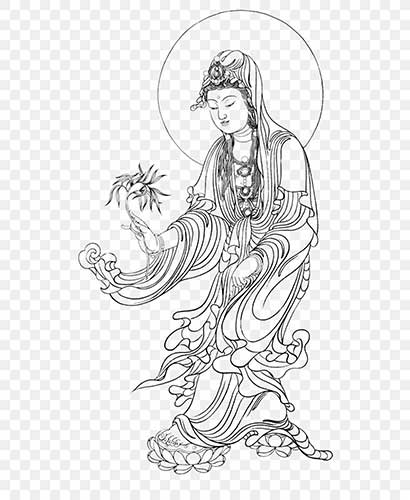The Lankavatara Sutra – Self-Realisation of Noble Wisdom
![]()
Chapter IV
Perfect Konwledge or Knowledge of Reality.
Then Mahamati asked the Blessed One: Pray tell us, Blessed One, about the five Dharmas, so that we may fully understand perfect knowledge?
The Blessed One replied: The five Dharmas are: appearance, name, discrimination, right-knowledge, and Reality. By appearence is meant that which reveals itself to the senses and to the discriminating-mind and is perviced as form, sound, odour, taste, and touch. Out of these appearances ideas are formed, such as clay, water, jar, etc., by which one says: this is such and such a thing and no other,- this is name. When appearances are constrasted and names compared, as when we say: this is an elephant, this is horse, a cart, a pedestrian, a man, a woman, or, this is mind and what belongs to it, – the things thus named are said to be discriminated. As these discriminations come to be seen as mutually conditioning, as empty of self-substance, as un-born, and thus come to be seen as they truly are, that is, as manifestations of the mind itself, – this is right-knowledge. By it the wise cease to regard appearances and names as realities.
When appearances and names are put away and all discrimination ceases, that which remains is the true and essential nature of things and, as nothing can be predicated as to the nature of essence, it is called the “Suchness” of Reality. This universal, undifferentiated, inscrutable, “Suchness” is the only Reality but it is variously characterised by Truth, Mind-essence, Transcendental Intelligence, Noble Wisdom, etc. This Dharma of the imagelessness of the Essence-nature of Ultimate Reality is the Dharma which has been proclaimed by all the Buddhas, and when all things are understood in full agreement with it, one is in possesion of Perfect Knowledge, and is on his way to the attainment of the Transcendental Intelligence of the Tathagatas.
* * *
Then Mahamati said to the Blessed One: Are the three self-natures, of things, ideas, and Reality, to be considered as included in the Five Dharmas, or as having their own characteristics complete in themselves.
The Blessed One replied: The three self-natures, the eightfold mind-system, and the twofold egolessness are all included in the Five Dharmas. The self-natures of things, of ideas, and of the sixfold mind-system, correspond with the Dharma of appearance, name and discrimination; the self-nature of Universal Mind and Reality corresponds to the Dharmas of right-knowledge and “Suchness”.
By becoming attached to what is seen of the mind itself, there is an activity awakened which is perpetuated by habit-energy that becomes manifest in the mind-system, from the activities of the mind-system there rises the notion of an ego-soul and its belongings; the discrimintations, attachments, and notion of an ego-soul, rising simultaneously like the sun and its rays of light.
By the egolessness of things is meant that the elements that make up the aggregates of personality and its objective world being characterised by the nature of maya and destitute of anything that can be called self-substance, are therefore un-born and have no self-nature. How can things be said to have an ego-soul? By the egolessness of persons is meant is that in the aggregates that make up personality there is no ego-substance, nor anything that is like an ego-susbtance nor that belongs
to it. The mind-system, which is the most characteristic mark of personality, originated in ignorance, discrimination, desire and deed; and its activities are perpetuated by perceiving, grasping and becoming attached to objects as if they were real. The memory of these discriminations, desires, attachments and deeds is stored in Universal Mind since beginningless time, ad is still being accumulated where it conditions the appearance of personality and its environment and brings about constant change and destruction from moment to moment. The manifestations are like a river, a seed, a lamp, a cloud, the wind; Universal mind in its voraciousness to store up everything, is like a monkey never at rest, like a fly ever in search of food and without partiality, like a fire that is never satisfied, like a water-lifting machine that goes on rolling. Universal mind as defiled by habit-energy is like a magician that causes phantom things and people to appear and move about. A throrough understanding of these things is necessary to an understanding of the egolessness of persons.
There are four kinds of Knowledge: Appearance-knowledge, relative-knowledge, perfect-knowledge, and Transcendental Intelligence. Appearance-knowledge belongs to the ignorant and simple-minded who are addicted to the notion of being and non-being, and who are frightened at the thought of being un-born. It is produced by the concordance of the triple combination and attaches itself to the multiplicities of objects; it is characterised by attainability and accumulation; it is subject to birth and destruction. Appearance-knowledge belongs to word-mongers who revel in discriminations, assertions and negations.
Relative-knowledge belongs to the mind-world of the philosophers. It rises from the mind’s ability to arrange, combine and analyse these relations by its powers of discursive logic and imagination, by reason of which it is able to peer into the meaning and significance of things.
Perfect-knowledge belongs to the world of the Bodhisattvas who recognise that all things are but manifestations of mind; who clearly understand the emptiness, the un-borness, the egolessness of all things; and who have entered into an understanding of the Five Dharmas, the twofold egolessness, and into the truth of imagelessness. Perfect-knowledge differentiates the Bodhisattva stages, and is the pathway and entrance into the exalted state of self-realisation of Noble Wisdom.
Perfect-knowledge (jnana) belongs to the Bodhisattvas who are entirely free from the dualism of being and non-being, no-birth and no-annihilation, all assertions and negations, and who, by reason of self-realisation, have gained an insight into the truth of egolessness and imagelessness. They no longer discriminate the world as subject to causation: they regard the causation that rules the world as something like the fabled city of the Gandharvas. To them the world is like a vision and a dream, it is like the birth and death of a barren-woman’s child; to them there is nothing evolving and nothing disappearing.
The wise who cherish Perfect-knowledge, may be divided into three classes, disciples, masters and Arhats. Common disciples are separated fro masters as common disciples continue to cherish the notion of individuality and generality; masters rise from common disciples when, forsaking the erros of individuality and generality, they still cling to the notion of an ego-soul by reasons of which they go off by themselves into retirement and solitude. Arhats rise when the error of all discrimination is realised. Error being discriminated by the wise turns into Truth by virtue of the “turning-about” that takes place within the deepest consciousness. Mind, thus emancipated, enters into perfect self-realisation of Noble Wisdom.
But, Mahamati, if you assert that there is such a thing as Noble Wisdom, it no longer holds good, because anything of which something is asserted thereby partakes of the nature of being and is thus characterised with the quality of birth. The very assertion: “All things are un-born” destroys the truthfulness of it. The same is true of the statements: “All things are empty”, and “All things have no self-nature”,- both are untenable when put in the form of assertions. But when it is pointed out that all things are like a dream and a vision, it means that in one way they are perceived, and in another way they are not perceived; that is, in ignorance they are perceived but in Perfect-knowledge they are not perceived. All assertions and negations being thought-constructions are un-born. Even the assertion that Universal Mind and Noble Wisdom are Ultimate Reality, is thought construction and, therefore, is un-born. As “things” there is no Universal Mind, there is no Noble Wisdom, there is no Ultimate Reality. The insight of the wise who move about in the realm of imagelessness and its solitude is pure. That is, for the wise all “things” are wiped away even the state of imagelessness ceases to exist.
Chapter V
The Mind System
Then Mahamati said to the Blessed One: Pray tell us, Blessed One, what is meant by mind (citta)?
The Blessed One replied: All things of this world, be they seemingly good or bad, faulty or faultless, effect-producing or not effect-producing, receptive or non-receptive, may be divided into two classes: evil out-flowings and the non out-flowing good. The five grasping elements that make up the aggregates of personality, namely, form, sensation, perception, discrimination, and consciousness, and that are imagined to be good and bad, have their rise in the habit-energy of the mind-system,- they are the evil out-flowings of life. The spiritual attainments and the joys of the Samadhis and the fruitage of the Samapatis that come the wise throgh their self-realisation of Noble Wisdom and that culminate in their return and participation in the relations of the triple world are called the non out-flowing good.
The mind-system which is the source of the evil out-flowings consists of the five sense-organs and their accompanying sense-minds (vijnanas) all of which are unified in the discriminating-mind (manovijnana). There is an unending succesion of sense-concepts flowing into this discriminating or thinking-mind which combines them and discriminates them and passes judgement upon them as to their goodness or badness. Then follows aversion to or desire for them and attachment and deed; thus the entire system moves on continuously and closely bound together. But it fails to see and understand that what it sees and discriminates and grasps is only a manifestation of its own activity and has no other basis, and so the mind goes on erroneously perceiving and discriminating differences of forms and qualities, not remaining still even for a minute.
In the mind-system there are three modes of activity distinguishable: the sense-minds fuctioning while remaining in their original nature, the sense-minds as producing effects, and the sense-minds as evolving. By normal fuctioning the sense-minds grasp appropiate elements of their external world, by which sensation and perception arise at once and by degrees in every sense-organ and every sense-mind, in the pores of the skin, and even in the atoms that make up the body, by which the whole field is apprehended like a mirror reflecting objects, and not realising that the external world itself is only a manifestation of mind. The second mode of activity produces effects by which these sensations react on the discriminating mind to produce perceptions, attractions, aversions, grasping, deed andhabit. The third mode of activity has to do with the growth, development and passing of the mind-system, that is, the mind-system is in subjection to its own habit-energy accumulated from beginningless time time, as for instance: the “eyeness” in the eye that predisposes it to grasp and become attached to multiple forms and appearances. In this way the activities of the evolving mind-system by reason of its habit-energy stirs up waves of objectivity in the face of Universal Mind which in turn conditions the activities and evolvement of the mind-system. Appearances, perception, attraction, grasping, deed, habit, reaction, condition one another incessantly, and the fuctioning sense-minds, the discriminating-mind and Universal Mind are thus bound up together. Thus, by reason of discrimination of that which by nature maya-like and unreal false-imagination and erroneous reasoning takes place, action follows and its habit-energy accumulates thereby defiling the pure face of Universal Mind, and as a result the mind-system comes into fuctioning and the physical body has its genesis. But the discriminating-mind has not thought that by its discriminations and attachments it is conditioning the whole body and so the sense-minds and discriminating-mind go on mutually related and mutually conditioned in a most intimate manner and building up a world of representations out of the activities of its own imagination. As a mirror reflects forms, the percieving senses percieve appearances which the discriminating-mind gathers together and proceeds to discriminate, to name and become attached to. Between these two fuctions there is no gap, nevertheless, they are mutually conditioning. The percieving sense grasp that for which they have an affinity, and there is a transformation takes place in their structure by reason of which the mind proceeds to combine, discriminate, apprise, and act; then follows habit-energy and the establishing of the mind and its continuance.
The discriminating-mine because of its capacity to discriminate, judge, select and reason about, is also called the thinking-mind, or intellectual-mind. There are three divisions of its mental activity: mentation which fuctions in connection with attachment to objects and ideas, mentation that fuctions in connection with general ideas, and mentation that examines into the validity of these general ideas. The mentation which fuctions in connection with attachment to objects and ideas derived from discrimination, discriminates the mind from its mental processes and accepts the ideas from it as being realand becomes attached to them. A variety of false judgements are thus arrived at as to being, multiplicity, individuality, value, etc., a strong grasping takes place which is perpetuated by habit-energy and thus discrimination goes on asserting itself.
These mental processes give rise to general conceptions of warmth, fluidity, motility, and solidity, as characterising the objects of discimination, while the tenacious holding to these general ideas gives rise to proposition, reason, definition, and illustration, all of which lead to the assertions of relative knowledge and the establishment of confidence in birth, self-nature, and an ego-soul.
By mentation as an examining fuction is meant the intellectual act of examining into these general conclusions as to their validity, significance, and truthfulness. This is the faculty that leads to understanding, right-knowledge and points the way to self-realisation.
* * *
Then Mahamati said to the Blessed One: Pray tell us, Blessed One, what relation ego-personality bears to the mind-system?
The Blessed One replied: To explain it, it is first necessary to speak of the self-nature of the five grasping aggregates that make up personality, although as i have already shown they are empty, un-born, and without self-nature. These five grasping aggregates are: form, sensation, perception, discrimination, consciousness. Of these, form belongs to what is made of the so-called primary elements, whatever they may be. The four remainding aggregates are without form and ought not to be reckoned as four, because they merge imperceptibly into one another. They are like space which cannot be numbered; it is only due to imagination that they are discriminated and likened to space. Because things are endowed with appearances of being, characteristic-marks, percievablesness, abode, work, one can say that they are born of effect-producing causes, but this cannot be said of these four intangible aggregates for they are without any form of marks. These four mental aggregates that make up personality are beyond calculability, they are beyond the four propositions, they are not to be predicated as existing or as not existing, but together they constitute what is known as mortal-mind. They are even more maya-like and dream-like than are things, nevertheless, as discriminating mortal-mind they obstruct the self-realisation of Noble Wisdom. But it is only by the ignorant that they are enumerated and thought of as an ego-personality; the wise do not do so. This discrimination of the five aggregates that make up personality and that serve as a basis for an ego-soul and ground for its desires and self-interests must be given up, and in its place the truth of imagelessness and solitude should be established.
* * *
Then said Mahamati to the Blessed One: Pray tell us, Blessed One, about Universal Mind and its relation to the lower mind-system?
The Blessed One replied: The sense-minds and their centralised discriminating-mind are related to the external world which is a manifestation of itself and is given over to pervceiving, discriminating, and grasping its maya-like appearances. Universal Mind (Alaya-vijnana) transncends all individuation and limits. Universal Mind is thoroughly pure in its essential nature, subsisting unchanged and free from faults of impermanence, undisturbed by egoism, unruffled by distinctions, desires and aversions. Universal Mind is like a great ocean, its surface rufflled by waves and surges but its depths remaining forever unmoved. In itself it is devoid of personality and all that belongs to it, but by reason of the defilments upon its face it is like an actor a plays a variety of parts, among which a mutual fuctioning takes place and the mind-system arises. The principle of intellection becomes divided and mind, the fuctions of mind, the evil out-flowings of mind, take on individuation. The sevenfold gradation of mind appears: namely, intuitive self-realisation,
thinking-desiring-discriminating, seeing, hearing, tasting, smelling, touching, and all their interactions and reactions take their rise.
The discriminating-mind is the cause of the sense-minds and is their support and with them is kept fuctioning as it describes and becomes attached to a world of objects, and then, by means of its habit-energy, it defiles the face of Universal Mind. Thus Universal Mind becomes the storage and clearing house of all the accumulated products of mentation and action since beginningless time.
Between Universal Mind and the individual discriminating-mind is the intuitive-mind (manas) which is dependent upon Universal Mind for its cause and support and enters into relation with both. It partakes of the universality of Universal Mind, shares its purity, and like it, is above form and momentariness. It is through the intuitive-mind that the good non out-flowing emerge, are manifested and are realised. Fortunate it is that intuition is not momentary for if the enlightenment which comes by intuition were momentary the wise would loose their “wiseness” which the do not. But the intuitive-mind
enters into relations with the lower mind-system, shares its experiences and reflects upon its activities.
Intuitive-mind is one with Universal Mind by reason of its participation in Transcendendal Intelligence (Arya-jnana), and is one with the mind-system by its comprehension of differentiated knowledge (vijnana). Intuitive-mind has no body of its own nor any marks by which it can be differentiated. Universal Mind is its cause and support but it is evolved along with the notion of an ego and what belongs to it, to which it clings and upon which it reflects. Through intuitive-mind, by the faculty of intuition which is a mingling of both indentity and percieving, the inconceivable wisdom of Universal Mind is revealed and made realisable. Like Universal Mind it can not be the source of error.
* * *
Then said Mahamati to the Blessed One: Pray tell us, Blessed One, what is meant by the cessation of the mind-system?
The Blessed One replied: The five sense-fuctions and their discriminating and thinking fuction have their risings and complete ending from moment to moment. They are born with discrimination as cause, with form and appearance and objectivity closely linked together as condition. The will-to-live is the mother, ignorance is the father. By setting up names and forms greed is multiplied and thus the mind goes on mutually conditioning and being conditioned. By becoming attached to names and forms, not realising that they have no more basis than the activities of the mind itself, error rises, false-imagination as to pleasure and pain rises, and the way to emancipation is blocked. The lower system of sense-minds and the discriminating-mind do not really suffer pleasure and pain – they only imagine they do. Pleasrue and pain are the deceptive reactions of mortal-mind as it grasps an imaginary objective world.
There are two ways in which the ceasing of the mind-system may take place: as regards form, and as regards continuation. The sense-organs fuction as regards form by the interaction of form, contact and grasping; and they cease to fuction when this contact is broken. As regards continuation,- when these interactions of form, contact and grasping cease, there is no more continuation of the seeing, hearing and other sense fuctions; with the ceasing of these sense fuctions, the discriminations, graspings and attachments of the discriminating-mind cease; and with their ceasing act and eed and they habit-energy cease, and there is no more accumulation of karma-defilment on the face of Universal Mind.
If the evolving mortal-mind were of the same nature as Universal Mind the cessation of the lower mind-system would mean the cessation of Universal Mind, but they are different for Universal Mind is not the cause of mortal-mind. There is no cessation of Universal Mind in its pure and essence-nature. What ceases to fuction is not Universal Mind in its essence-nature, but is the cessation of the effect-producing defilments upon its face that have been caused by the accumulation of the habit-energy of the activities of the discriminating and thinking mortal-mind. There is no cessation of Divine Mind which, in itself, is the abode of Reality and the Womb of Truth.
By the cessation of the sense-minds is meant, not the cessation of their percieving fuctions, but the cessation of their discriminating and naming activities which are centralised in the discriminating mortal-mind. By the cessation of the mind-system as a whole is meant, the cessation of discrimination, the clearing away of the various attachments, and, therefore, the clearing away of the defilments of habit-energy in the face of Universal Mind which have been accumulating since beginningless time by reason of these discriminations, attachments, erroneous reasonings, and following acts. The cessation of the continuation aspect of the mind-system, namely, the discriminating mortal-mind the entire world of maya and desire disappears. Getting rid of the discriminating mortal-mind is Nirvana.
But the cessation of the discriminating-mind can not take place until there has been a “turning-about” in the deepest seat of consciousness. The mental habit of looking outward by the discriminating-mind upon an external objective world must be given up, and a new habit of realising Truth within the intuitive-mind by becoming one with the Truth itself must be established. Until this intuitive self-realisation of Noble Wisdom is attained. The evolving mind-system will go on. But when an insight into the five Dharmas, the three self-natures, and the twofold egolessness is attained, then the way will be opened for this “turning-about” to take place. With the ending of pleasure and pain, of conflicting ideas, of the disturbing interests of egoism, a state of tranqulisation will be attained in which the truths of emancipation will be fully understood and there will be no further evil out-flowings of the mind-system to interfere with the perfect self-realisation of Noble Wisdom.

OPENING HOURS
| Week Days | 8:00 – 5:00 |
| Saturday | 9:00 – 5:00 |
| Sunday | 11:00 – 4:00 |




